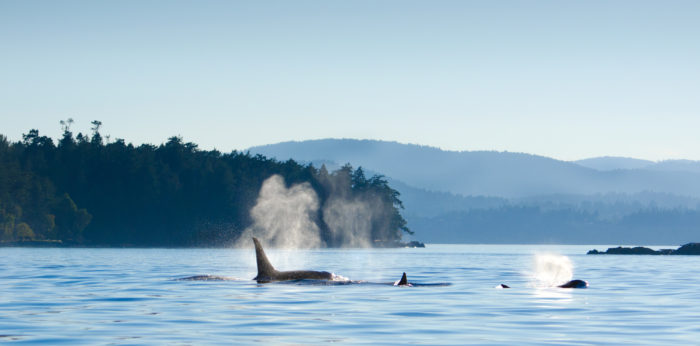Stz’uminus elders describe orcas as ‘family’ at NEB hearings
By Cara McKenna
When Pearl Harris of Stz’uminus First Nation was a child, she learned to see the killer whales who would pass by her territory as family.
The elder said southern resident orcas would often come up to shore of Shell Beach, and she would watch and listen to them.
With guidance from her grandmother, Harris learned to see the animals as both teachers and as kin.
“We were an area where they come to visit and rest in their journey,” she said.
“They were our family.”
Harris told the story to the National Energy Board’s latest hearing process around the Trans Mountain pipeline expansion in December.
The new hearing process was held to hear oral traditional evidence from First Nations — particularly stories about the cultural importance of killer whales and other marine life.
The Federal Court of Appeal overturned Canada’s approval of the project last August, saying more work needed to be done around Indigenous consultation and reviewing marine impacts.
After hearing dates in Victoria and Calgary, the NEB heard oral traditional evidence in Nanaimo from various communities including Stz’uminus.
Stz’uminus Elder Ray Harris spoke about one of his first memories involving seeing an orca.
“We were on a canoe with grandpa, and a whale surfaced not too far from us,” Harris said.
“Grandpa stopped paddling and he said, ‘Be quiet.’ I asked him, ‘How come I have to be quiet?’ He said … ‘That’s what they need because they talk to each other.’ They already knew the importance of quiet still waters for the whales.”
Harris and others spoke about how they are concerned about increased tanker traffic and its impact on already endangered southern resident killer whales: both the noise and increased risk of an oil spill.
“We can’t even imagine a life without whales,” he said.
“The killer whale is just like us. They breathe air just like us. They eat exactly the same foods as us. They look after their young just like us. They have a way to look after each other by respecting their grandmothers and their mothers.”
There are currently just 75 southern resident orcas remaining. With the pipeline expansion, tanker traffic is set to increase sevenfold.
Stz’uminus Elder George Harris added that he feels that the tanker increase is a “huge risk” that could cause the southern residents go extinct.
“I want to know what we can do, what kind of plan we have, that would reassure us that the killer whale will go on in the future,” he said.
“The memory I have right now is not the newborn killer whales that survived; it’s the ones that have died.”
Pearl Harris added to Stz’uminus and other First Nations along the Coast, the sea life is part of them.
“We believe that the killer whale is an ancestor,” she said.
“If we lose the killer whale, we lose some of our teachings. Our teachers. … I keep saying that they are our spirit, they are our people. We all have that strong belief.”
Other nations that took part in the NEB’s three-city oral traditional evidence hearings include Snuneymuxw, Squamish, Musqueam, Tsleil-Waututh, Kwantlen, Tsawout and more.
The Canadian government has given the federal energy regulator a deadline of Feb. 22 to review evidence and submit its final report and recommendations.




